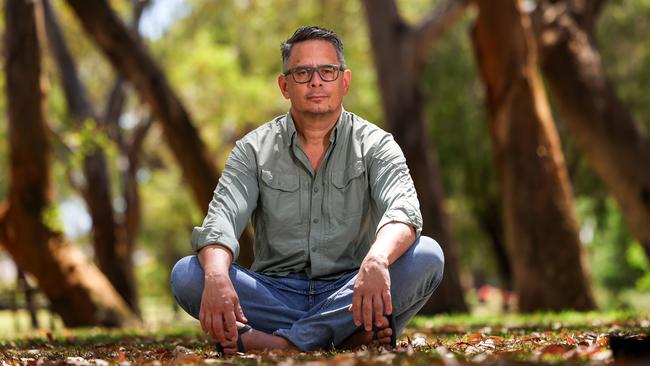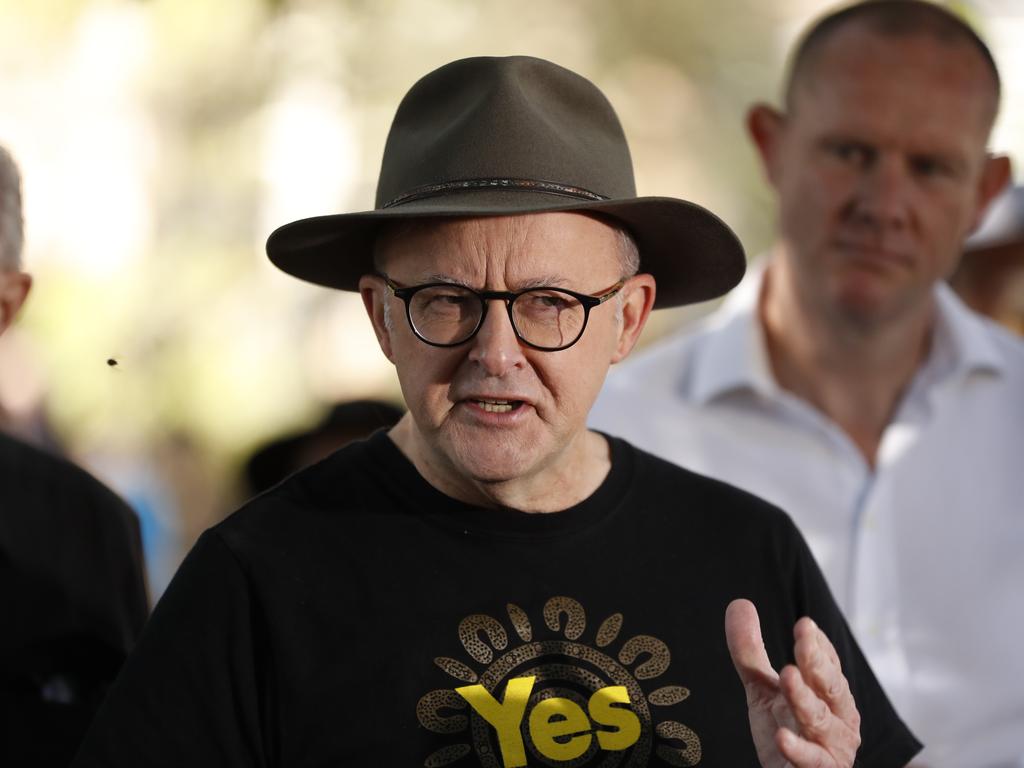First Aboriginal treasurer Ben Wyatt says it’s time to move on from voice, treaty and truth
The nation’s first Aboriginal treasurer and federal cabinet minister have each proposed a path to end the post-referendum standstill in Indigenous policymaking, saying that it is time to move on from the Uluru Statement from the Heart.

The nation’s first Aboriginal treasurer and federal cabinet minister have each proposed a path to end the post-referendum standstill in Indigenous policymaking, saying that it is time to move on from the Uluru Statement from the Heart.
Yamatji man Ben Wyatt, who made history when he was appointed Western Australian treasurer in the McGowan Labor government, writes in The Weekend Australian that the failure of the voice referendum has put Indigenous policy at risk of being “owned by the far left”. He says that this sees Aboriginal and Torres Strait Islander people as permanent victims.
Mr Wyatt’s uncle, Ken Wyatt – whose appointment as Indigenous Australians minister in the Morrison government was also a first – warns the Indigenous organisations that signed up as partners in the Closing the Gap agreement four years ago are responsible for results, just as bureaucracies and governments are.
Ben Wyatt, a director of resource giants Rio Tinto and Woodside Energy, favours a renewed focus on economic empowerment of Indigenous Australians, in part because it is a policy direction on which left and right can agree.
“Right now, it is almost impossible to predict how our nation might arrive at some form of consensus when it comes to Aboriginal Affairs,” Ben Wyatt said.
“The direction of policy travel was highly dependent on the successful outcome of the referendum on constitutional recognition. Many eggs were placed in the pot of an Aboriginal voice. The comprehensive rejection of the referendum and, by implication, the Uluru Statement from the Heart, has left the commonwealth government bureaucracy frozen and uncertain, and the national Aboriginal leadership disappointed, angry, bitter and confused.”
But in a pre-election warning to Anthony Albanese, Uluru architect Megan Davis says “nothing is settled in this country” and no prime minister should be released from addressing the original grievance of dispossession. Professor Davis, who continues to lead a grassroots movement towards a form of constitutional recognition for Aboriginal and Torres Strait Islander peoples, says it is dangerous to dismiss the 6.2 million voters who said yes to an Indigenous voice at the referendum in October 2023.
While Mr Albanese pledged in his 2022 victory speech that he was committed to implementing all three elements of the Uluru Statement from the Heart, Ben Wyatt believes Aboriginal Australia must now free him from any obligation to do this. This is because the emphatic rejection of a voice – the first plank of Uluru – has clear political implications for the treaty and truth-telling that were to follow.
“Much of the national Aboriginal leadership still clings to statements made by the Prime Minister on election night, when that leadership should understand the raw politics of what the referendum did to those statements,” he said.
“Australia has voted on a different direction and the PM should be released to develop a new agenda, and he needs to be confident to be bold in what that might look like. This is difficult for Aboriginal Australia as much was tied to the three elements of Uluru – voice, treaty, truth.
“I need to be blunt, but certainly not disrespectful; those three words will not be part of the national Aboriginal affairs policy development in the coming decade. This is the politics of a failed referendum.
“The great danger is that, without leadership from the mainstream political parties, Aboriginal policy gets owned and marginalised by the far left – attached to the strange, fringe politics of the unachievable.
“I have spent three decades of my life fighting this marginalisation and its drift back into the world of the far left, that seek to define Aboriginality into permanent victims and, therefore, poverty, is extremely dangerous.
“Similarly, the far right have no interest in claiming the space, there is no intellectual energy in even thinking about the Aboriginal question because Aboriginality itself is rejected – for the far right history ended the moment the British flag arrived.
“The danger of the current drift is that it leaves victories, hard won over previous decades, vulnerable to attack and wind-back – witness the increasing push against even those areas of previously settled common ground such as the welcome to country or validity of the Aboriginal flag as a flag of national identity.”
Ken Wyatt, whose support for the voice put him at odds with several senior Liberal partyroom colleagues, told The Weekend Australian “the future of Aboriginal affairs in Australia post the voice referendum outcome should ideally balance economic development and wealth creation with ongoing efforts to achieve Closing the Gap targets”.
“Both approaches are interconnected and essential for sustainable progress, and neither should be pursued in isolation,” he said.
As the Albanese government consults on a framework for Indigenous economic development, Ken Wyatt says developing and implementing an economic strategy is not about governments funding Aboriginal businesses indefinitely. He favours a seeding grant approach over permanent government funding.
He also says that as Australia seeks to reduce the disparity between Indigenous and non-Indigenous people, Aboriginal organisations must be as answerable as government. “All levels of government, including their agencies, and Aboriginal and Torres Strait Islander organisations, must be held accountable for their endeavours to close the gaps in the lives of First Nations people,” Ken Wyatt said.
Pat Turner, who oversees the Closing the Gap agreement with government in her role as Coalition of Peaks lead convener, says there is a consensus and way forward set out in the Closing the Gap agreement and its 17 targets for reduced disparity.
Just five of the targets are on track to be met by the agreement’s end in 2030.
“We will be working hard to ensure that Aboriginal and Torres Strait Islander community-controlled organisations across the country share in decisions with government on what is needed to support communities’ economic aspirations,” Ms Turner said.
The lack of progress under the recast Closing the Gap agreement has led the Productivity Commission to strongly criticise the states and the NT for failing to share decisions with Indigenous communities, as they signed up to do in 2020. These shared decisions were intended to be a new way of governing that draws on local knowledge about what works and what has failed in the past. However, the PC has found it is business as usual in bureaucracies.
Some Indigenous leaders say governments and their bureaucracies will never fully comply with promises to consult or share decisions with Indigenous communities unless they have to. Voice proponents say this was the point of a constitutionally enshrined voice; to compel the state to consult.






To join the conversation, please log in. Don't have an account? Register
Join the conversation, you are commenting as Logout